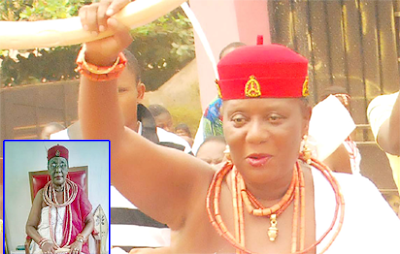Sunday, March 11, 2018
 |
| Omu Anioma |
Were there battles you fought to ascend the throne?
There were no battles. Our forefathers set up the Omu traditional institution over 700 years ago. In Aniomaland, from Asaba to Agbor, among others, the forefathers designed that every community must have a traditional ruler but in Omu, we have a traditional ruler who is a man and another who is a woman. However, the male traditional ruler is superior in communities where there is also a female traditional ruler because man comes first, and, when you are crowned as in my case in Omu, you must come to the palace to reign; you must leave your marital home. At the point of coronation, you are bestowed male rights; that is why you can break the kolanut, you become a man and a woman put together. I tried to find out why.
Research shows that God created man and woman, but it is the woman that is better positioned to understand woman. That is why the Omu means Eze Nwanye, female king in charge of women, female youths, markets, ancestral shrines, businesses. More importantly, she is the spiritual custodian, the one who advises the male traditional ruler and the town spiritually. That is why they felt this woman should not be married so she can be in a state of chastity. The woman is also seen as the mother of all in the town. If you are living with a man and he slaps you, it is believed to be a slap on the town. But as Omu, you can marry out children who will bear children for you. Female chiefs of Omu are patterned in a way that they are different from male chiefs. There is no contest. You don't aspire to it. It is God who reveals who will become the traditional ruler for women. In some Anioma communities, it is hereditary; in others, it is rotational.
What is the experience like? How do you operate in an environment in which many believe royalty exclusively belongs to men?
Because I am a media practitioner, I have brought visibility to the Omu throne. Definitely, men will not feel at ease. And of course some traditional rulers will not feel at ease but it is not a modern creation; it has been there for ages and there is nothing they can do about it. Our forefathers wanted the woman to play her role and the man to also play his role to move the community forward. I am a member of the Omu traditional rulers' council to speak for women. And in case there is trouble, it is easy for you to come in. I have my own palace and chiefs. In my area, you find men who are not comfortable with my status but I did not choose myself; it is spiritual. I just want the hand of God to continue to be on my head. I don't want anybody to like me. I just do the right thing, do what the ancestors want me to do.
Are you a Christian?
I am a traditionalist. I worship God through the ancestors. Every religion worships God, the only difference is how you go to God. I took one course in comparative religion in the United States out of interest.
You are from a region where women suffer deprivation in terms of widowhood. How have been involved in redressing this challenge?
In my community we have abolished harmful burial rites. We have sensitized our men because if the rites continue, their daughters will also experience them. We have also sensitized the women because they implement these rites. We have also reduced the mournful period. Where you had one month, we have reduced it to two weeks; three months to one month and so on and so forth. In my place, a man shaves his head for the deceased wife and the wife shaves her head for the deceased husband. Before now, when a man dies, the wife wears black clothes for one year and I asked the men and women why? They could not give any strong reason and we have dropped the practice. People are now focused on training their children.
There is also a problem of inheritance for the girl-child in some communities in the Niger Delta. It is so bad for married women in the communities that they can't build houses in their names for fear of their husbands and the culture.In the west, they are more advanced.
The Yoruba woman inherits from the father. The northern woman too doesn't suffer this. It is worse in the east where women cannot inherit anything. But in Okpanam where I am from, many women can now give their daughters properties. The man in the Niger Delta should realise that he is undoing himself by not allowing his wife to actualize her potentials. When a man sees it as competition, this is where the problem comes. Men should allow women to invest for the sake of their children. The man is undoing himself when he creates the circumstances that make the wife to use the name of her brothers to build and when she passes on the property goes to the brothers who do not pass it on to her children.
Your stool, did it originate from Benin Kingdom?
History says we came from Benin, Igara, some parts of the East. The word Omu is palm front. A research by a professor from Igbuzor concluded that yam is male and palm tree female. Palm front connotes fertility; that is why the stool is Omu.
Word for Niger Delta women

No comments:
Post a Comment